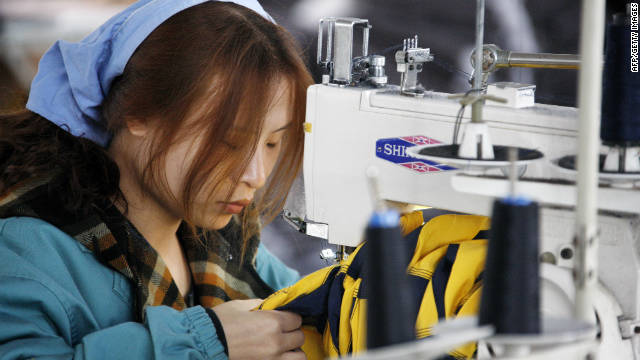|
|
本帖最后由 lilyma06 于 2011-11-24 15:16 编辑
China labor unrest flares as orders fallBy Rahul Jacob, FT.com
November 24, 2011 -- Updated 0228 GMT (1028 HKT)

A Chinese worker goes about her chores at a textile factory in Huaibei, east China's Anhui province on November 21.
原文链接:http://edition.cnn.com/2011/11/23/business/china-labor-unrest/index.html
(CNN) -- China is facing its worst wave of labour unrest since a series of wildcat strikes at Japanese-owned car plants last year, as declining export orders force factories to reduce worker pay.
More than 10,000 workers in Shenzhen and Dongguan, two leading export centres in southern Guangdong province, have gone on strike over the past week. The latest protests broke out on Tuesday at a Taiwanese computer factory in Shenzhen.
"There has been an intensification of labour unrest in the past week that is probably the most significant spike in unrest since the summer of 2010," said Geoffrey Crothall of China Labour Bulletin, a Hong Kong-based labour advocacy group that monitors unrest in China.
The strikes come amid mounting concerns about the global economy, which is suffering from the European sovereign debt crisis and a weak recovery in the US. Fears about the Chinese economy grew on Wednesday after a manufacturing index compiled by HSBC fell to levels not seen since March 2009. Last week, Guangdong's acting governor said the province's exports dropped 9 per cent in October from the previous month. Provincial leaders are also contending with widespread protests by farmers over land seizures. On Monday nearly 5,000 residents in the town of Wukan marched on government offices in a peaceful protest.
Factories are cutting the overtime that workers depend on to supplement their modest base salaries, after a drop in overseas orders.
According to CLB, the average basic wage for electronic workers is about Rmb1,500 ($236) a month, but rises to Rmb2,500 with overtime. "Their basic wage is never enough on its own without overtime," Mr Crothall said.
Tuesday's protests followed a bigger demonstration last week at a shoe factory in Dongguan that supplies footwear to Nike and Adidas. About 7,000 workers at the Taiwanese factory, owned by Pou Chen, objected to a cut in their overtime and management's decision to shift some work to other factories in the Chinese hinterland and Vietnam, where labour costs are lower.
"We were forced to return to the factory," one worker told the Financial Times. "But we just sit there. No one is operating machines."
The worker, who did not want to be identified, said the local government had taken a tough stance during negotiations and sided with the management.
|
|